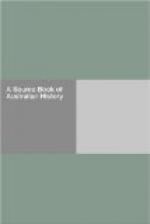Another of the diggers’ grievances was the extreme insecurity of life and property on the mines. While the police force were snugly housed at headquarters, in a peaceable and orderly neighbourhood, the populous and remote gullies were the nightly scenes of deeds of robbery and violence. Every evening men were knocked down and brutally treated or “stuck up” and robbed. Every night horses were stolen, tents broken into, and “holes” plundered of gold by the “night fossickers”—miscreants who watched for the richest “holes” during the day, marked them, and plundered them at night. In October 1852 at a place called Moonlight Flat (near Forest Creek), these desperadoes had become so numerous and shameless, and their outrages so frequent, that the miners rose en masse against them. A public meeting was convened; blue-shirted diggers made stirring appeals to their auditory; a deputation was appointed to proceed instantly to Melbourne to remonstrate with the Government, and to implore it to adopt energetic measures for extirpating the “hordes of ruffians” that infested their neighbourhood, and the persons of many of whom were well known there.
THE BUSHRANGERS
+Source.+—The Golden Colony (G.H. Wathen, 1855), pp. 138, 143-150
The combination of convictism in Tasmania and gold in Victoria and New South Wales produced bushranging on a large scale. Convicts now had a chance of living well if they escaped, and many took advantage of the opportunity.
If the Australian roads in winter may be well likened to those English roads of 200 years ago, out of which the King’s Coach had to be dug by the rustics, so may the Australian Bushranger be regarded as the legitimate representative of the traditionary highwayman who levied toll at Highgate, or stopped the post-boy and captured the mailbags in Epping Forest. The real, living bushranger is, however, more of a ruffian and less of a hero than our ideal highwayman; for time, like distance, softens down the harsh and the coarse, and gives dignity to the ignoble.
Never, perhaps, did a country offer so tempting a field to the public robber as Victoria did during the first year or two after the gold discovery. The interior was wild and uninhabited, abounding with lonely forests. Travellers were numerous, and mostly carried money or gold; for none were poor. The roadside public-houses were daily the scenes of drunken revelry. The police were few and untrained; and the mixed and scattered population at the several diggings offered a ready asylum in case of pursuit. Add to all this that, separated from Victoria by a mere strait, was the depot for the most accomplished villains of Great Britain, and it needed no prophet to foresee that the roads of the new gold country would very soon be swarming with thieves and desperadoes.




